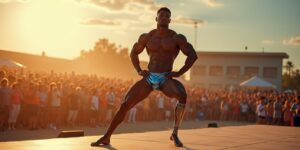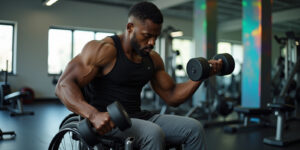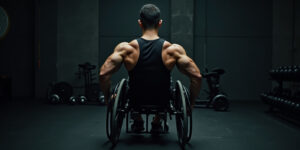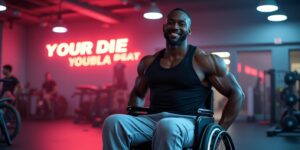Disabled Bodybuilders Defying Odds: Introduction to Disabled Bodybuilders
Bodybuilding is not just for people without disabilities. Disabled bodybuilders are proving that they can also dominate the sport with hard work, dedication, and accommodations. In fact, disabled bodybuilders can participate in bodybuilding competitions with various accommodations such as wheelchair ramps, lower stages, and audio cues. Overloading the upper back is one way disabled bodybuilders can add thickness to their physique. Deadlift variations such as partials, rack pulls, and deficit pulls can also benefit disabled bodybuilders. Twitter has added “disability” to its list of protected groups for reporting abusive tweets. Disabled bodybuilders are a part of a supportive community that encourages them to pursue their passion while accommodating their needs.What is Disability Bodybuilding?
Disabled bodybuilders defying odds by becoming growing phenomenon that challenges the notion of disabilities. This sport has several health benefits, including improved quality of life for people using wheelchairs. Bodybuilder Steve Alexy with cerebral palsy inspires millions through his competitions, showing that athletes with disabilities can achieve enviable levels of fitness and personal satisfaction through physical feats. Disability bodybuilding offers visible results and personal rewards beyond physical fitness, such as building community and support systems. The sport also challenges able-bodied individuals to look beyond limitations and embrace diversity in all aspects of life. Overall, disability bodybuilding is a powerful movement that promotes inclusivity and celebrates the strength and perseverance of disabled athletes.
Overcoming Adversity in Bodybuilding
Disabled bodybuilders are breaking barriers in the sport, proving that disability is not a hindrance to achieving success. Steve Alexy, who has cerebral palsy, has won several bodybuilding competitions and has inspired millions. Reggie Bennett, a wheelchair bodybuilder, is a disability advocate, community leader, personal trainer, and motivational speaker. Wes Hamilton, an adaptive athlete and motivational speaker, lost over 100 pounds and transformed his life after becoming paralyzed from the waist down. He believes fitness and nutrition are key to a better life.
Bodybuilding requires a great deal of physical and mental resilience, and overcoming adversity is an essential part of the journey. Here are some tips for overcoming challenges in bodybuilding:
- Focus on the bigger picture: Remember why you started bodybuilding in the first place, and keep your long-term goals in mind. Whether it’s to improve your health, build a better physique, or compete in a bodybuilding show, staying focused on your ultimate objective will help you stay motivated through adversity.
- Embrace the challenge: Every obstacle is an opportunity for growth. Instead of viewing challenges as setbacks, try to see them as chances to push yourself and become better. When you encounter difficulties, remind yourself that overcoming them will make you a stronger and more resilient athlete.
- Adjust your expectations: Bodybuilding is a challenging sport, and progress is not always linear. Be prepared for setbacks and plateaus, and adjust your expectations accordingly. Instead of expecting to make progress every week, focus on making small improvements over time.
- Seek support: Building a support network of coaches, trainers, and fellow athletes can be invaluable when facing adversity. Lean on these individuals for encouragement and guidance when you need it most.
- Take care of your mental and physical health: Adversity can be stressful, both mentally and physically. Make sure to prioritize rest, recovery, and self-care to maintain your mental and physical well-being. This includes getting enough sleep, eating a healthy diet, and taking time for activities that help you relax and recharge.
Importance of Building Community
Building a community for disabled bodybuilders is crucial for their overall well-being and support. Bodybuilding as a sport involves muscular development, presenting physiques to judges, and maintaining high standards of quality. Disabled individuals can find a sense of accomplishment through bodybuilding and see physical results.
Anand Arnold, an Indian bodybuilder who became paralyzed, still pursued his dream and inspired others through his journey. Building a community provides disabled bodybuilders with support and motivation to push themselves further in the sport.

Creating Inclusive Spaces for Disabled Bodybuilders
Disabled bodybuilders, such as Reggie Bennett and Steve Alexy, have become inspiring role models by overcoming physical challenges to compete and win trophies. However, building a community that supports disabled bodybuilders is about more than just recognition. Non-profit groups are advocating for more accessible spaces and transportation for people with disabilities, including those who want to pursue bodybuilding. Disability coaches and case managers also play an essential role in empowering people with disabilities to achieve their fitness goals.
Creating inclusive spaces for disabled bodybuilders is critical. Organizations like Shamsher Foundation are stepping up to help by providing adaptive sports equipment and other resources. Disability voter registration week and other initiatives are also essential for promoting the voices and rights of people with disabilities, including those in the bodybuilding community. By building a supportive community, we can ensure that disabled athletes have the resources they need to succeed in the sport of bodybuilding.
Support Systems for Disabled Bodybuilders
Disabled bodybuilders face unique challenges when it comes to building their bodies. Some exercises, such as deadlifts, can cause injury if not done correctly. Additionally, recovery time is crucial for muscle growth and strength development, especially when lifting heavy weights. However, the bodybuilding community has shown tremendous support for disabled athletes, offering special training programs and competitions.
Finding and Utilizing Resources for Disabled Bodybuilders
Finding and utilizing resources for disabled bodybuilders can be challenging, but there are several ways to locate the resources you need. Here are a few suggestions:
- Online Resources: There are many online communities and resources available for disabled bodybuilders. These may include social media groups, forums, blogs, and websites dedicated to adaptive fitness. Some examples include the Shamsher Foundation, Adaptive Training Foundation, the Disabled Sports USA, and the National Center on Health, Physical Activity and Disability.
- Fitness Trainers: Consider hiring a fitness trainer who has experience working with disabled clients. A qualified trainer can provide guidance on adapting exercises to meet your individual needs and help you develop a customized workout plan.
- Adaptive Equipment: There are a variety of adaptive fitness equipment and tools available that can help you to perform exercises safely and effectively. Some examples include resistance bands, stability balls, hand cycles, and wheelchair-accessible weight machines.
- Local Community Centers: Check with your local community centers, gyms, and fitness studios to see if they offer adaptive fitness programs or classes. These programs may be geared specifically toward individuals with disabilities and can provide a supportive environment for your fitness journey.
- Disability Support Groups: Joining a disability support group can help you to connect with others who share similar experiences and challenges. These groups may be able to provide recommendations for fitness resources in your area and offer encouragement and support as you work toward your fitness goals.
Remember, it’s important to consult with your doctor before starting any new exercise program, especially if you have a disability. They can help you to determine what types of exercises are safe and appropriate for your individual needs.
Let’s Sum Up
Disabled bodybuilders are breaking down barriers and proving that anything is possible with the right mindset, community, and support systems. Despite facing unique challenges, they are dominating the sport of bodybuilding by pushing past their limits, overcoming stereotypes, and inspiring others to do the same. Building community and support systems for disabled bodybuilders plays a pivotal role in shaping their journeys and providing them with the resources they need to thrive.
Let’s come together as a community to celebrate this amazing sport and create opportunities for everyone to succeed.





